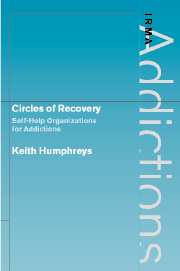Book contents
- Frontmatter
- Contents
- Acknowledgements
- 1 Definitions, scope, and origin of the health-related self-help group movement
- 2 An international tour of addiction-related mutual-help organizations
- 3 Does self-help group participation lead to positive addiction-related, psychiatric, and medical outcomes?
- 4 A different perspective on change in self-help organizations: spirituality, identity, life stories, friendship networks, and politicization
- 5 How should government agencies, healthcare organization, and clinicians interact with self-help organizations?
- Epilogue: summing up, moving forward
- References
- Index
4 - A different perspective on change in self-help organizations: spirituality, identity, life stories, friendship networks, and politicization
Published online by Cambridge University Press: 31 July 2009
- Frontmatter
- Contents
- Acknowledgements
- 1 Definitions, scope, and origin of the health-related self-help group movement
- 2 An international tour of addiction-related mutual-help organizations
- 3 Does self-help group participation lead to positive addiction-related, psychiatric, and medical outcomes?
- 4 A different perspective on change in self-help organizations: spirituality, identity, life stories, friendship networks, and politicization
- 5 How should government agencies, healthcare organization, and clinicians interact with self-help organizations?
- Epilogue: summing up, moving forward
- References
- Index
Summary
Moving beyond the treatment-outcome perspective
The previous chapter concluded that participation in addiction-related self-help groups can promote improvement on important clinical outcomes, for example reduced substance abuse, psychopathology, and medical comorbidities. From some perspectives, inquiry should stop here, because the likely value of self-help groups as a treatment for substance abuse has been established. However, the clinical treatment-evaluation perspective on self-help groups is a necessary but insufficient lens through which to understand the effects of self-help group involvement. Self-help organizations resemble professional treatments in some respects, but they also have unique aspects that can influence members in ways not typically associated with healthcare interventions, and indeed some members who have already resolved their substance-abuse problem seek out self-help groups specifically for these other benefits (Kaskutas, 1994, 1996a). This chapter evaluates the implications of this reality for outcomes that are not usually considered part of the clinical treatment-evaluation perspective.
A focus upon such outcomes follows naturally from the recognition that, in many ways, self-help organizations are more akin to communities than to treatments. Individuals participate in them for indefinite periods, structure social activities around them, actively work to keep them in existence, make friends within them, and so forth. In the process, members encounter a philosophy and set of values that some scholars termed the “mutual-help organization's “ideology”” (e.g., Antze, 1979; Cerclé, 1984; Kassel & Wagner, 1993; Suler, 1984).
- Type
- Chapter
- Information
- Circles of RecoverySelf-Help Organizations for Addictions, pp. 128 - 148Publisher: Cambridge University PressPrint publication year: 2003

